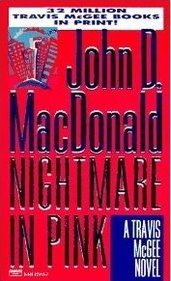By John D. MacDonald 1964, Fawcett Publications , 143 pages
 Some of my friends tell me it’s time to lighten up again. (Well, they tell me to lighten up all the time.) So, for the book review, I’ve decided to continue to explore more of the subtleties and insights of Travis McGee in this his second incarnation, Nightmare in Pink, by literary GrandMaster MacDonald.
Some of my friends tell me it’s time to lighten up again. (Well, they tell me to lighten up all the time.) So, for the book review, I’ve decided to continue to explore more of the subtleties and insights of Travis McGee in this his second incarnation, Nightmare in Pink, by literary GrandMaster MacDonald.
What amazes me for all the books I’ve read—including a McGee novel by MacDonald perhaps a decade ago—that I’ve only just now “discovered” John D’s immense talent. Seriously. In his first of the Travis McGee series, The Deep Blue Good-By, I saw his penchant for biting social commentary.
“I am weary of the whole dreary deadening structured mess we have built into such a glittering, top-heavy structure that there is nothing left to see but the glitter, and the brute routines of maintaining it.”
His words, written in the early 1960s, apply moreso today. Just think of the gross commercialization of our lives, the constant barrage of images and sounds telling us “you’re inadequate, buy more stuff.”
Four decades ago, Travis McGee disdains the modern world, yet builds an honorable life for himself in the midst of it. How? By becoming a beach bum in Florida! Not truly a bum, more an independent contractor who takes a job when money from the previous job starts waning. His deal is ever the same: “I recover what was taken from you—conveniently, the yous are mostly damsels in distress—and I keep half.”
In Nightmare, “Trav” is paying a debt to an old war buddy who lies paralyzed and suspects his sister’s fiancé died under circumstances that suggest foul play. He wants Travis to travel to New York and get to know his sister, provide some comfort and assistance, then “poke around” and see what he can find out.
She had one of those hearty little figures typical of a certain type of small girl. The hand-span waist, and the rich swell of goodies above and below.
Nina Gibson was clean but not neat. Great stacks of decorator and craft and design magazines. Shelves of presentation designs that never worked out. A huge drawing table with Luxo lamps, clamped onto it, like big gray grasshoppers….
Well, there certainly is a fair amount of poking to transpire, yet through it all Trav assumes, quite naturally and even movingly, the role of champion of romantic love. But more immediate, we get the John D. MacDonald impression of New York City, a town without pity, much less time for any of the niceties that make people truly enjoy living in society.
It turns out Nina’s fiancé was a likely target of some not-so-nice super-rich folk. (MacDonald is equally at home describing the world of the very well-to-do, stars of the Social Register and Who’s Who.) We find out the fiancé had been snooping around his old-money investment firm and smelled a rat. The rat, using sophisticated accounting and other tricks, was siphoning millions from the legitimate heir of the company.
In Trav’s pursuit of information, we get several more observations about sex, love, police work, prostitution, New York City, business, etc. I only include a quote regarding business:
The old city was being filled with these tall tasteless rectangles, bright boxes which diminished the people who had to live and work in them. People kennels. Disposable cubicles for dispensable people.
I wondered if perhaps these hideous new tax-shelter buildings, with people sealed into the sour roar of manufactured air, didn’t play some significant part in creating New York’s ever-increasing flavor of surly and savage bitterness—a mocking wise-guy stink of discontent. Ugliness creates more ugliness. So the buildings could contribute, and so could the narrow greed of the truly vicious little trade unions. Screw you, buster, I’m getting mine.
…which leads into a deft indictment of the union mentality.
It’s simply amazing how many beautiful passages of exacting, even remedial, prose the planet has to offer can be found in one of Mr. MacDonald’s mystery novels. Even for the mill of my current preoccupation with the spiritually enlightening notions of Eckhart Tolle, I find grist:
There is a time in all such things when eyes look into eyes, with vision narrowing and intensifying until there is nothing left but the eyes, searched and searching. This is a strange and tingling thing that narrows the breath—but it is a communication, and once it has happened there is an awareness beyond words.
I suppose it’s ironic: such totally aware words speaking of awareness beyond them. He’s talking about Nina, who he’s come to deeply love. Who is this Travis McGee? A ladies’ man and a man’s man, a sensitive soul who seems to value independence, psychological and economic, above all things. Definitely hero-status worthy, even if Ayn Rand never gave him a nod (tho she was the consummate Mickey Spillane fan).
The story concludes, confronting some harrowing James Bond-like criminality—recall that Ian Fleming with the Bond series was acquiring quite a following in those days—and the ending is fully conducive to the next eagerly awaited installment.
This post has been read 2983 times!



And MacDonald takes chances. His descriptions of, and explanations for, the way Junior Allen makes both Cathy Kerr and Lois Atkinson essentially his willing, nymphomaniac sex slaves will make every self respecting academic feminist in the world scream in protest. And he scalds George Brell with 180 degree water to get information out of him, so surely the sadist charge is awaiting somewhere.
http://postmoderndeconstructionmadhouse.blogspot.com/2015/03/john-d-macdonald-deep-blue-good-by.html#.VS9VM9KUc7W